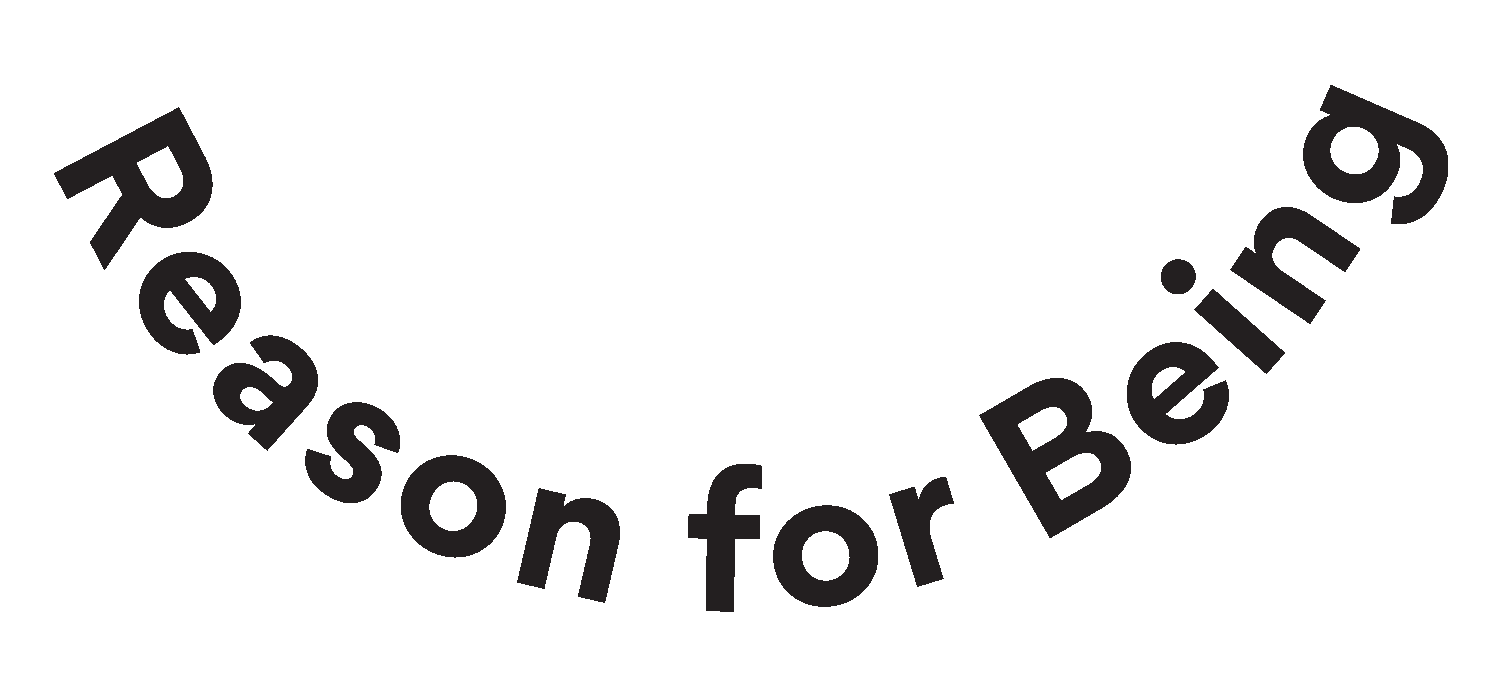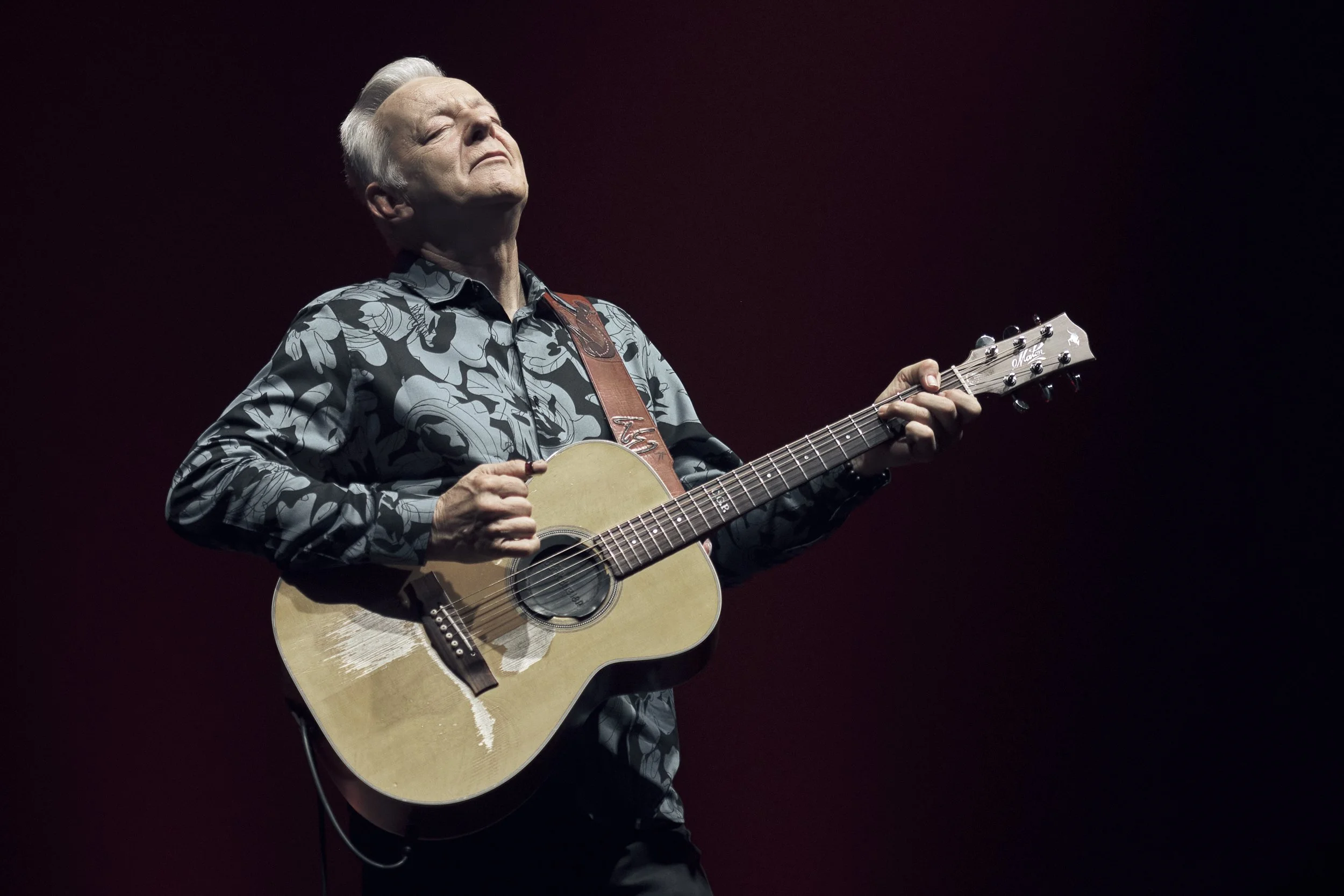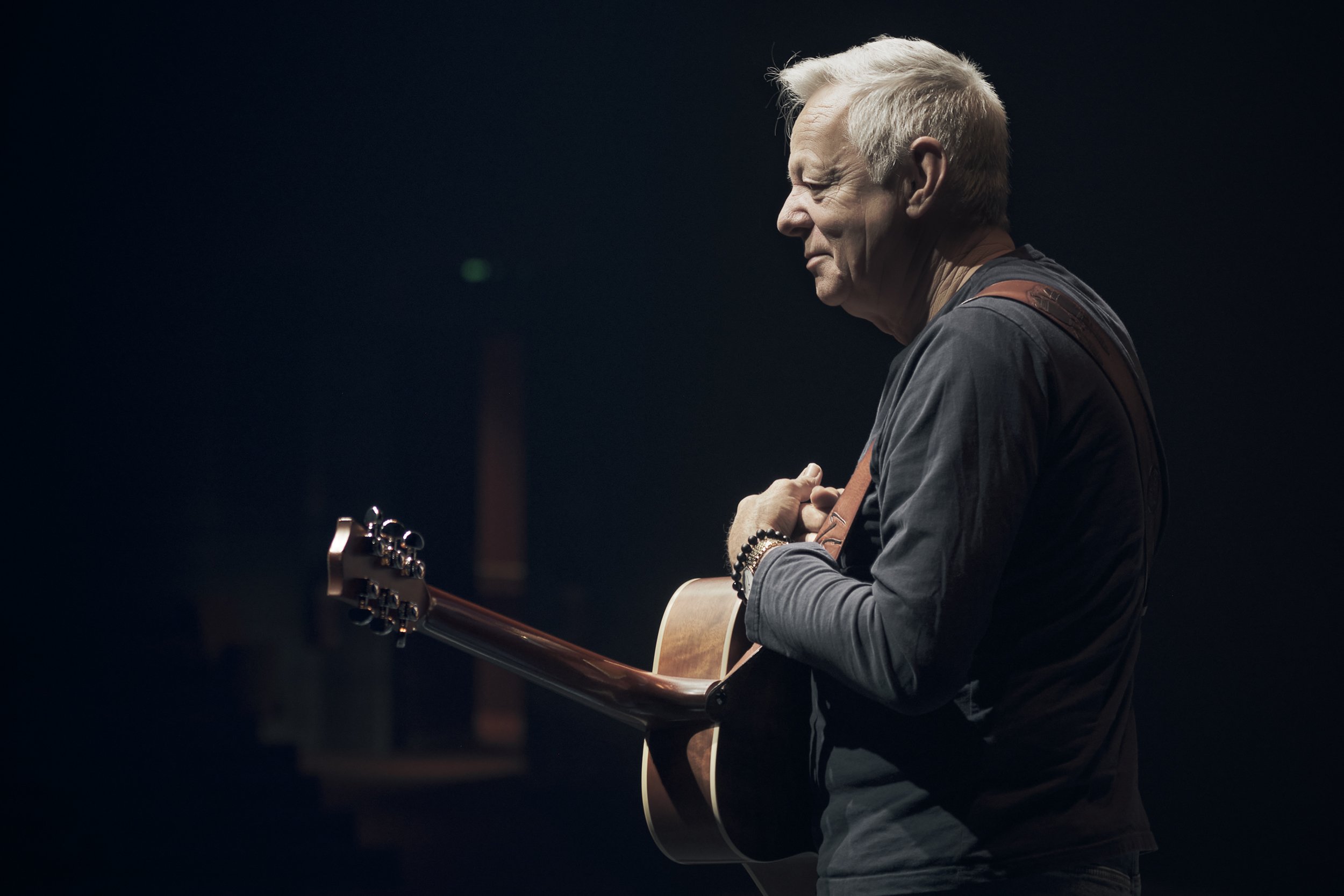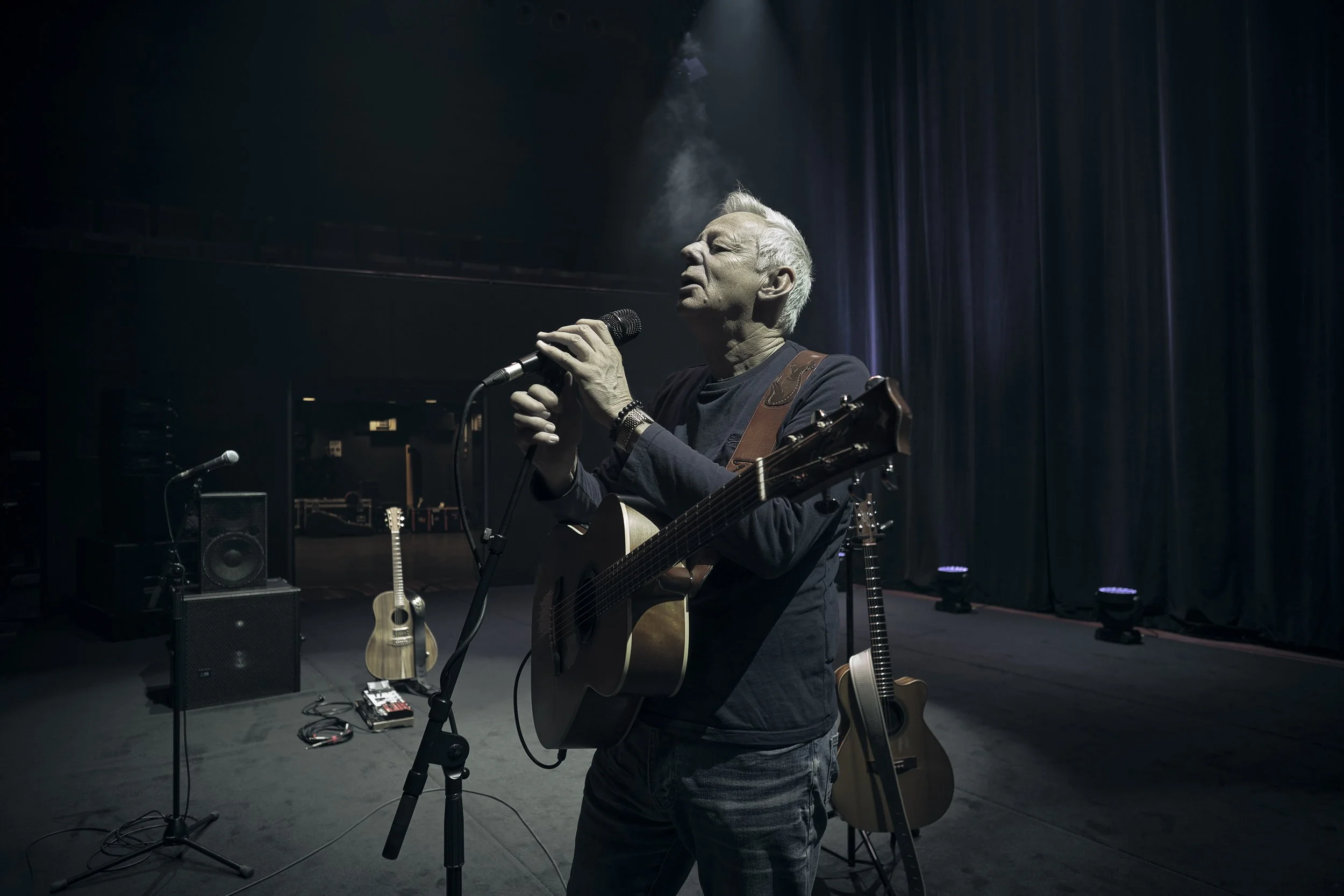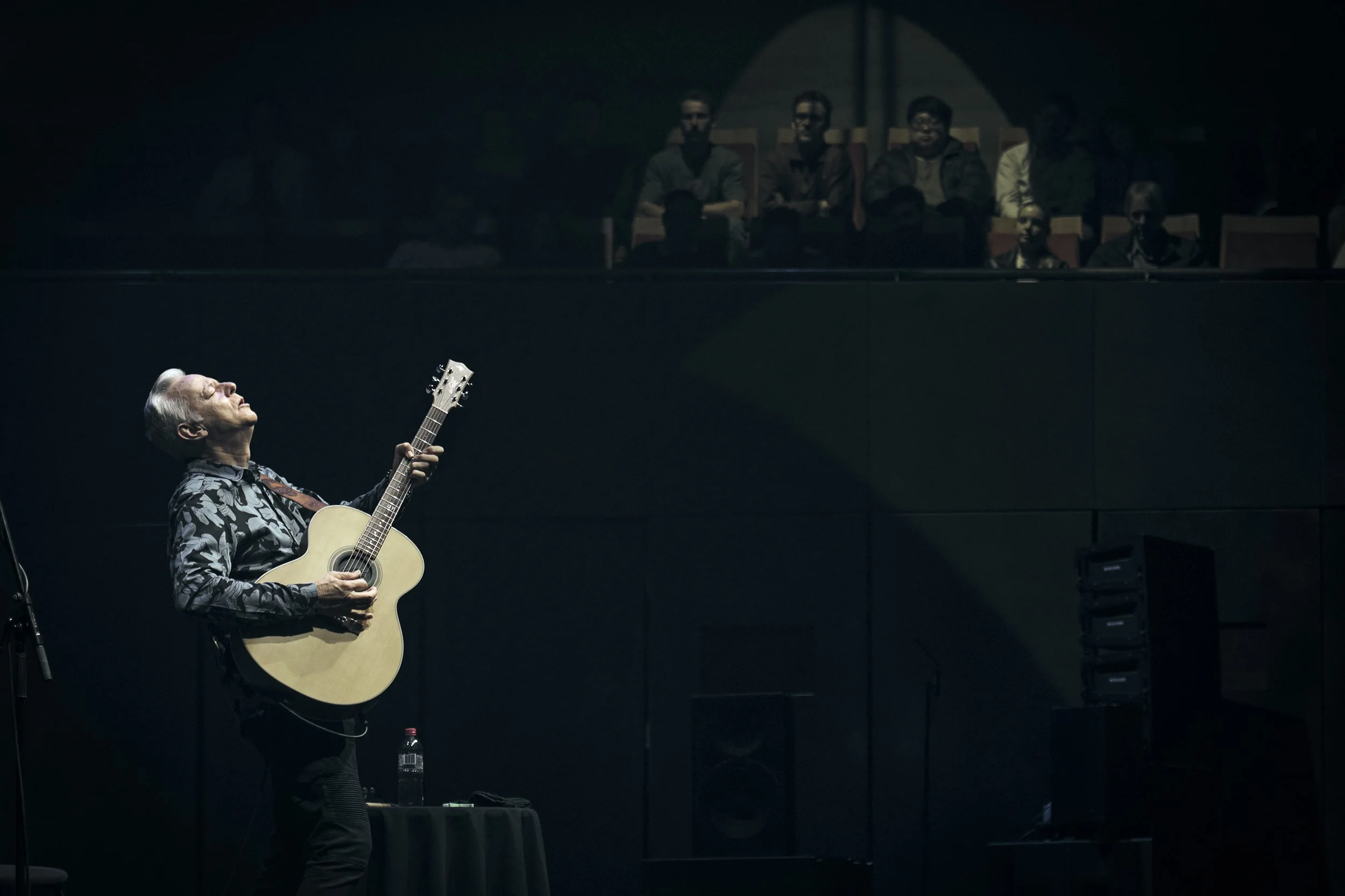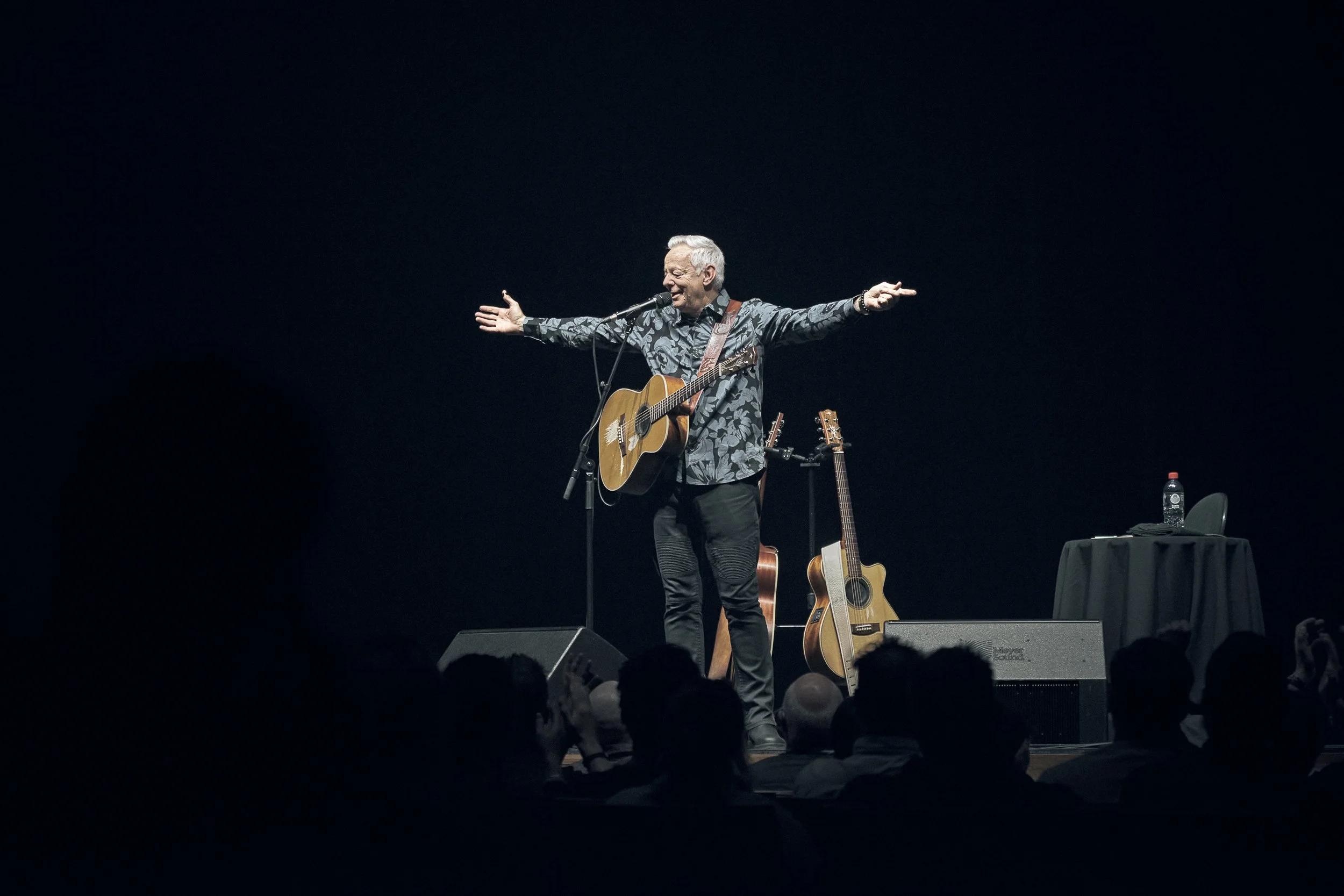Reason #8 / Tommy Emmanuel C.G.P. / Guitarist
Certified Guitar Player…
Scroll ↓
Tommy Emmanuel C.G.P. / Guitarist
Australian-born guitarist Tommy Emmanuel is considered one of the greatest acoustic guitar players in the world. Born to entertain, the humble showman is renowned for his melodic finger style. His fluid technique involves using all his fingers and thumbs to simultaneously play the bass lines, chords, melodies, and harmonies, resulting in a captivating multi-dimensional sound. Tommy is a true virtuoso and holds the title of C.G.P. (Certified Guitar Player), awarded to him by his childhood guitar hero, Chet Atkins. Only four other guitarists, including John Knowles, Steve Wariner, Jerry Reed, and Paul Yandell, share this prestigious title.
I met Tommy in 1991 at a public launch event for his (then) new album, Determination. I was 19 and a fanboy. He recognised my youthful passion for photography and, in the following year, invited me to 'hang out' backstage. He was instrumental in kickstarting my early career as a photographer in the Australian music industry, and I documented his rise to fame in the mid-90s. We lost contact over two decades ago when he moved offshore to Nashville, Tennessee, USA, where he now resides.
I reunited with Tommy after 25 years at his most recent concert in Australia at Hamer Hall (at Arts Centre Melbourne) on the 28th of May, 2023. Despite his newfound fame, he's as humble and down-to-earth as I remember him...
'I take my armour off and make myself completely vulnerable because I believe that's how love works...'
- Tommy Emmanuel C.G.P.
25th of November 2022.
03:12am, Melbourne.
My mobile phone rang, bedside - the call was from Nashville, Tennessee, USA.
Half asleep and thinking it was an unsolicited call, I didn't answer.
03:14am, Voicemail alert.
I pressed PLAY:
'Isamu-san, it's Tommy Emmanuel calling you. Thanks for your email. I will try and call you another time. Lots of love, Brother.'
As I bolted upright in bed, eyes wide open, I did my two-plus twos.
A few hours earlier, I had sent an email reaching out to him. I'd heard through the grapevine that he was touring Australia in 2023.
It had been 25 years since I last spoke to Tommy, so it was a pie-in-the-sky attempt at reconnecting. He was at the top of my list when I envisaged the 'Reason For Being' project. In my mind, he epitomised someone with a life purpose.
With his (now) superstar status, a reply was not expected.
With my heart thumping, I jumped out of bed and pressed redial on my phone.
My voice quivered as Tommy answered.
I felt like the vulnerable 19-year-old fanboy again - reminded of the time the celebrity musician I idolised called me at my parent's home all those years ago.
It felt like history repeating itself.
Forward 31 years, and he sounded as warm and caring on the phone as I recall, and I'm amazed that he even remembered me.
He asked if it was 3pm in the afternoon? I told him no.
After apologising for the time mixup, he asked about my life - catching up on years past. He is saddened to hear of my father's recent passing.
'He was so kind to me. I will always remember your dad...' he said.
Hearing those words made me quite emotional...he'd only met my father briefly on two occasions.
Stripped of his instrument, Tommy Emmanuel is one of the most caring, humble people I have ever met, let alone anyone with celebrity status.
His love for people and those who have crossed his lifepath is as genuine as you will ever find. It's at the core of his being, and music is a means for him to connect and bring joy to people.
'I've been like that since I was a little kid,' he says.
'It's important to me. I want people to be happy. I want people to forget their troubles and distract them from the noise of life. The joy is always there because I'm chasing it through music. Seeing the surprise in peoples' eyes is worth living and working for.'
It's uncanny how Tommy can distract and engage - on and off stage. He is stoutly positive, rarely talks negative, and always has a (positive) story to tell.
He describes his musical style as telling stories without words.
TE: 'I can tell you a story and take you somewhere without words. My songs are my stories, and how I play is very much connected to my soul.'
I am reminded of his innate ability to engage when I reunite with him a few months later at Melbourne's Hamer Hall - backstage, camera in hand, just like the (good) old days.
Unlike some concerts I've attended in recent times, Tommy's audience was completely engaged, with barely a phone camera in sight.
TE: 'My purpose is to entertain people, to show them something that might give them a different view on life. I want people to forget their troubles and distract them with my music...'
'The moment we are disarmed, we open, and that's when the spiritual side of music comes in and does a bit of house cleaning and gives that person some relief from the stress of life.'
Spirituality aside, by any measure, he is a technical master of the acoustic guitar and highly regarded by his peers and (guitar) enthusiasts alike.
But for Tommy, it's not his end goal.
TE: 'Technique to me is invisible. I make it look easy; that is the technique (of being invisible)...'
'Nobody did it better than Chet Atkins. When you watch him play, you'd think he's not doing anything, but all this amazing music is coming out.'
Tommy's (invisible) technique and incredible sound dazzled his 2,500 fans at Hamer Hall that night - Chet Atkins would've been proud.
His signature finger-picking style transcended country, blues, and jazz vibes while simultaneously creating multifaceted percussion section sounds - treating the body of his guitar like a drum.
It's incredible to watch as he effortlessly creates a sound that you would swear is being produced by multiple musicians.
He is the epitome of a one-person band.
Unlike the 90s when he had a travelling band and crew of over 15, he prefers to play solo these days (with the occasional guest artist). He now travels the world with only two other crew members and three Australian-made Maton acoustic guitars.
He rarely has a set playlist for his live shows, and without the need to manage a whole band, he prefers to read the crowd and go with the flow.
However, his approach can be a challenge for a guest artist.
Backstage during rehearsal at Hamer Hall, I met violinist Patrick Roberts, Tommy's special guest for the night.
He asks Tommy when he is scheduled for his duet?
TE: 'Oh, about halfway through the show... just after my guitar/drum solo...'
Cue drum solo.
Tommy uses the body of his battle-scarred Maton guitar as a drum, tapping out complex rhythms and beats with his fingers, palms, and a drummer's brush. He also hits the microphone with the brush to create a bass drum-like effect with punch and clarity.
Drum solo over, Tommy warmly introduces violinist Patrick (who recently recorded a single alongside the legendary Sting with yours truly, Tommy Emmanuel, on guitar).
Together, they play a memorable rendition of Unchained Melody...
30th of May 2023.
A couple of days after the concert, I text-messaged Tommy to say how wonderful it was to reunite and see him in concert again.
I also mentioned that I would like to conduct an interview at some point, and I'd be happy to do it over a Zoom call wherever he finds himself next.
'Ring, ring...'
TE: 'Isamu-san, I'm still here in Melbourne! What are you doing tonight? Come over to my hotel, and we can hang out. I'm not leaving till tomorrow night.'
08:00pm - I rock up at Tommy's hotel, birthday cake in hand (I knew it was his 68th Birthday the following day).
Back in his room, I presented Tommy with a hand-made birthday card created by my eight-year-old daughter Hannah, who witnessed his show several nights ago.
Inside, she wrote:
'You are really good at playing the guitar...'
Tommy smiles, and we shoot a thank you video for Hannah.
For the next few hours, we shoot the breeze like a couple of old mates over cups of peppermint tea.
Eventually, at 10pm, we start the interview.
I begin by asking about his latest Aussie Tour.
'It was a complete sell-out. We did 14 concerts in 16 days,' says Tommy.
But rather than boasting about his sold-out shows, he talks about all the blessings.
TE: 'There are so many blessings from this latest tour. I've had tremendous and meaningful experiences because of my music and connection with Australia. It's been four years since my last visit here.'
He played in country venues he hadn't played in since the early 90s, such as Bundaberg, Gladstone, and Colloundra. Since the pandemic, it's been a struggle for many of these towns.
Tommy's presence has given employment to many people in these towns, as all the venues were sold out, and restaurants and hotels were full.
TE: 'That's a nice feeling because it's another part of what I do. Other people also benefit, and I like that. I also had the chance to thank all the theatre volunteers and those behind the scenes who don't receive the recognition they deserve.'
'When you realise the impact of what you do on people, you realise - this is a good job!'
Do you remember the first time music resonated with you? I ask.
TE: 'When I was a baby - I wouldn't sleep unless my mother put my pram in front of the record player. I don't remember, of course, but my mother told me.'
'She said that I would only settle down to sleep once the music was on. She'd play records by Jim Reeves, Hank Williams, Jimmy Rogers, and Hank Snow - all country musicians.'
So, when did he decide to make a career out of music?
TE: 'I never decided; I just did it. I never wanted to do anything else. I fancied myself as a mechanic because my dad was a mechanic, but I wasn't mechanically minded. I had no plan. I just ran like a bull out of a gate.'
Born in 1955 in a coal mining town called Muswellbrook, New South Wales, Tommy picked up a guitar at age four.
Recognising his children's musical talents, their father created a family band, sold their home, and took his family on the road.
By age six, Tommy was already a professional working musician playing in his family band, the Emmanuel Quartet, with his brother Phil and sister Virginia.
So what was it about the guitar instrument?
TE: 'I just loved the sound of it and just wanted to play it; my mother showed me how. I was just fascinated by the instrument, and when my brother Phil started playing lead guitar, we discovered we could play together - that was magical.'
Initially, Tommy was the rhythm and bass player.
TE: 'I assumed the guitar player played the bass with his thumbs, so I worked out all the rhythm parts, including the bass notes. A few years later, I discovered that there was an instrument called the bass guitar!'
His first significant influence was a guitarist named Chet Atkins, also known as Mr. Guitar. He was an American musician who helped create what's known as the Nashville sound - a country music style.
TE: 'When I was 7, I had an epiphany - I discovered Chet Atkins. We were already on the road by then, and I heard his sound, which changed my life.'
'I didn't know what it was, but I knew then that it was my destiny.'
Chet Atkin's musical style (sometimes referred to as Travis picking) was his ability to play chords, melodies, bass lines, and harmonies simultaneously using the thumb and fingers of the right hand, achieving a dynamic sound from his guitar.
At age 11, inspired and intrigued, Tommy wrote a letter to his idol. He wrote:
'Hi, Mr. Atkins, I'm a big fan of yours. I've got some of your records, and I'm trying to figure out what you are doing. Could you please send me a photo...'
He didn't have his address, so he wrote Mr. Chet Atkins, Nashville, America, on the envelope.
3 months later, when Tommy came home from school, a big brown envelope was waiting in his room.
TE: 'I opened it and pulled out the letter. The letterhead was gold and read: From the office of Chet Atkins RCA, Victor Records. It was a beautifully typed letter, with his signature on the bottom and a signed black and white photograph of him.'
'I can't tell you what that meant to me. That my hero, the greatest living instrumentalist of all time, would write back to some unknown kid on the other side of the world.'
When Tommy was 25, he eventually visited his idol in Nashville, Tennessee, USA.
In 1997, the pair went on to record as a duo, releasing the album The Day Finger Pickers Took Over the World. Two years later, in 1999, Atkins christened Emmanuel a Certified Guitar Player (C.G.P.), making him one of only five musicians to receive the distinction from the guitar master.
I can see that Tommy's early childhood experience of receiving a reply letter from his guitar hero profoundly influenced his life. At age 67, he recalls his childhood story like it was yesterday.
He now treats his adoring fans with the same exuberance, love and compassion.
Many people have experienced Tommy paying it forward, and I am one of those lucky recipients. He invited me into his world with open arms all those years ago and helped me and my rise as a photographer in the Aussie Music Industry.
For young upcoming musicians with promise, he's generously given away his signature guitars to select individuals, often to those who can least afford them.
Tommy fondly recalls the time he gifted an 8-year-old Croatian-born guitarist, Frano Živković, with his original 'Yellow Mouse' nicknamed guitar.
He shows me a YouTube clip of Frano playing one of Tommy's songs, Half Way Home, and says, 'How magical is that!'
So, what does music mean to him?
TE: 'It's simple. It's healing and magical in so many ways. It's something that I pursue and dig for, like a treasure. You've got to keep digging because there are more jewels down there, and I try to hit the bullseye with a melody and chord.'
His songs (jewels) often come from deep within himself.
TE: 'There's a song called Those Who Wait. At one point in my career, I had people (record companies and management) pressuring me not to go solo. They said there was no market for a solo acoustic guitarist. So I said - I'd create one - and broke free from them...'
'That song is about finding the courage to be yourself.'
Speaking of being himself, legendary American rock guitarist Joe Satriani once said that Tommy Emmanuel 'lets the audience in...'
I ask what he means by that?
TE: 'I do what most people don't do. When I walk on stage, I go like this...'
He opens his arms high and wide.
'I do that kind of symbolically. I take my armour off and make myself completely vulnerable because I believe that's how love works...'
'I also try to get rid of myself as much as possible, my flawed human side, so that I can become a channel that has much more flow to it because what separates us from the spiritual power in this universe is when our ego gets in the way.'
Speaking of ego, I ask if he is proud of his achievements?
In 2010, Tommy Emmanuel was appointed a Member of the Order of Australia (AM). He has two ARIA Awards and has been nominated twice for the Grammys. He and his brother Phil also performed at the closing ceremony of the 2000 Sydney Olympics.
TE: 'I try not to be. Pride is a dangerous thing. It's way too connected to ego. Someone once told me: You're unique, just like everyone else. I'm talking about genuine humility because you will separate yourself without that...'
'It's taken me a while to learn the values of humility. I know I'm not in charge, and a higher power wants me to get out of the way - so I can be useful. I am proud of what my children do and what my team and I put together to entertain our fans.'
However, his humility and passion for his art have come at a price. He revealed that, behind the scenes, he had been grappling with alcohol and drug addiction.
With the help of therapy, he has been sober for three years.
TE: 'We all have a calling, but the bottom line is, everything in life comes at a price.'
'My life is incredible (now). I've never been so healthy, happy, or free, but I'd be lying if I said I had no regrets.'
'I have caused all the pain that has happened in my life. My addiction was a way of coping with the pain of wanting to be a good father and husband and dealing with the people who did the wrong thing by me, those I trusted.'
Just when I thought I'd caught him in a negative moment, he says:
TE: 'The silver lining is, I can help others going through the same thing...I can tell them what happened to me and what I did to find a way out. That can help others. Nothing goes to waste in God's economy. All the bad can be turned to gold.'
'My anonymity is important, but I'm ready to help anybody. We all have flaws because we are human. It took me a long time to learn what was happening to me. People kept giving me cheese, and I kept running until I couldn't run anymore, and I had to figure out why.'
So, what kind of legacy would he like to leave?
TE: 'Always be kind and loving - that would be the message - if you could do that, you'd be better than I am.'
11:00pm.
As we conclude the interview, Tommy says:
'I'm glad we did that. I feel alive; it felt like therapy.'
We finally light a candle on his birthday cake.
As I'm about to leave, he gives me a warm embrace and says:
'I love you, Brother.'
I love you too, Tommy - Happy Birthday.
